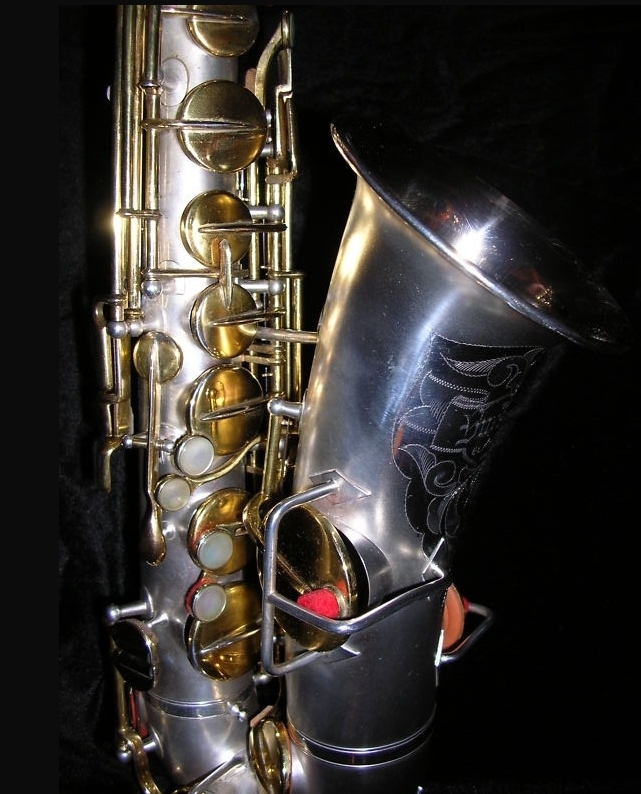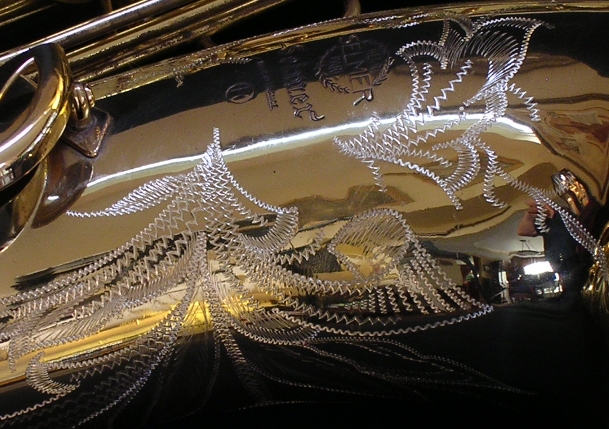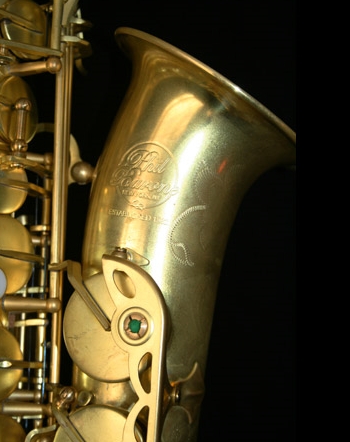

Bare brass was in general the most
common finish in the early days followed by silver plated,
gold plated,
nickel plated before lacquered saxophones was introduced.
The finish on the instrument acts in
much the same way as anyting else attached to the body,
damping the vibrations at certain frequencies. The degree and
frequency
of this effect according to
the type of finish applied.

RELACQUERS
Many saxophones are
relacquers and
there are many opinions about this. Some are claiming
that this is only a myth
and has no influence on the sound at all while others claims
that this
could
have significant implication to the sound from the saxophone.
It’s difficult to provide
evidence of either, however the sure thing about relacquers is
that the
market
are concerned about this and are not willing to pay the same for
a
relacquer as
for a
saxophone with original lacquer.
So to conclude this, the
reason the market are not willing to pay the same for a
relacquer is
probably that
you cannot be sure how the job is done. In the process of
removing the
old
lacquer, the process could be everything between rough blasting/
polishing treatments
removing some of the brass material from the body or it could be
a very
gentle
chemical
removal of the old lacquer removing no material from the body
at all.Further
the lacquer
type could be all kind of types having all kind of good- or
bad
qualities.
And it’s hard to tell if
the relacquer film thickness on the saxophone is thinner or
thicker
than the
original film thickness on the lacquer was.
So how to find out if the saxophone is a relacquer ?
1- Ask the seller
2-
Look
at
the tan / color of
the lacquer and find other pictures from same model and
compare.
Normally,
relacquer is much brighter than the original lacquer.
3-
Look
at
the touch points
for wear. Normally an old saxophone with normal use,
will have some
kind of lacquer
wear at least on the palm keys, thumb rest e.t.c
4-
Look
at
the engraving and
see if it’s sharp and clear, especially in the finest lines and
details.
Contemporary saxophones are normally engraved after they are
lacquered
and then it's easy to see.
However, you may find a
really nice relacquer and if you regret later and are not
satisfied,
you can
always
remove the lacquer gently
using
chemicals and use it as bare
brass sax.
LACQUERS

Lacquered saxophones plays normally great provided that the lacquer is original.
If the lacquer is worn, the recommendation is to leave it as is !
Any relacquer on the
saxophone will reduce it’s value in the market and may also
reduce the
desired
quality
of the sound.
If the lacquer is awful, remove all of the lacquer gently using chemicals only.
There are at the moment no
known records that indicates that any old vintage saxophone
gently
stripped to
bare brass and polished should reduce the value provided that
one can
document
that
removal of the original remaining lacquer is done gently with
chemicals
only.
BARE BRASS
AND PLATED

The
popularity of bare
brass has increased in later years and you may even now buy
new
saxophones
based on bare brass with no lacquer on
it.
The
manufacturers claims
that lacquer restricts the vibration of the metal and
produces
a thinner/
more muted sound, meaning that the
saxophones
without any lacquer
produces
a more natural and
a more full sound.
Many
believe further that silver-,
gold- and nickel plated saxophones have similar qualities due
to
the fact that
they don’t have the lacquered surface, only an extremely thin
layer of
metal
added to the body.
HOW TO IDENTIFY GOLD PLATE VS. BARE BRASS
Dampen
a small ball of cotton wool with vinegar ( any kind will do
) and place it on
the body.
Leave it 30 minutes or so. If the metal looks
cleaner or has gone slightly red, when you lift it
away, it's brass.
If nothing at all has
happened it's gold. You can polish
off the red cast with metal polish.
You might see results in as
little as 15 minutes, if you want to avoid the red tint.